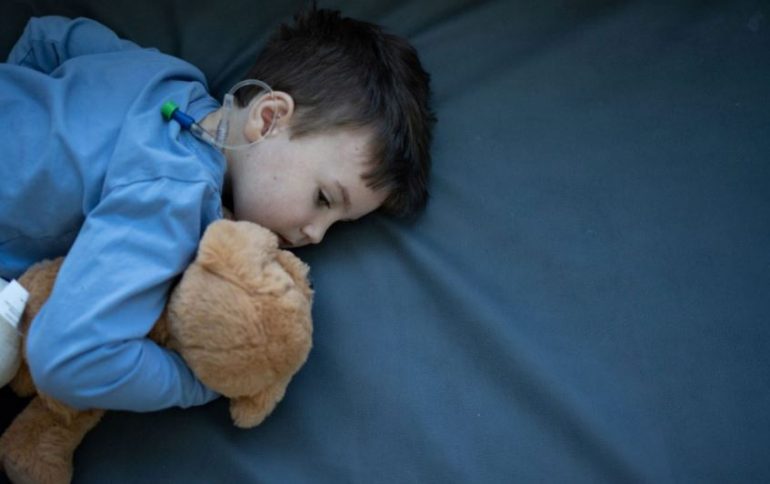Javan Haley saw her daughter fold in two in pain at their home in Manasse, Virginia.
Until recently, the most healthy 9-year-old could hardly walk because of her stomach pain. For about two months she suffered from headaches, exhaustion, stomach ache, sore throat, earache and shortness of breath, telling her mother that she was in severe pain. She collapsed in bed when she returned from school and ended up losing almost eight kilos, which was already very weak.
"We could not find a connection between her symptoms," her mother told the Guardian. "Some days were worse than others. "There were days when he could not even get out of bed because of a stomachache."
Their nightmare started shortly after they were attacked by Covid-19 last August. Both went through the illness relatively mildly and then recovered. But later, 9-year-old Hailey got sick again.
In October, after multiple visits to the pediatrician and emergencies, she was referred to the National Pediatric Hospital in Washington DC, where she was diagnosed with Long Covid and enrolled in the Long Covid Pediatric Program, which treats people under 21 years of age.
Rare but present
Although her diagnosis is considered very rare in children, Hailey is not the only one who suffers. Across the United States, children complain of a wide range of symptoms - from headaches, stomachaches and dizziness, to exhaustion, "brain fog" and mood swings, long after the infection.
The long Covid can last from four weeks to several months, although there are many different definitions. And despite the fact that it manifests itself differently depending on the stage of development, doctors find that it actually affects all ages, including infants.
Of the more than 848.000 people who died from coronavirus in the United States, about 727 were minors, according to the CDC. Less than 1,5% of children with coronavirus disease need treatment, according to the American Academy of Pediatrics (APA).
The relationship of vaccination
However, the vaccines were delayed in being distributed to the children, while their vaccination was lagging behind. As of May, the CDC had not approved the Pfizer vaccine for children under 15, and only in November did it approve it for children 5 to 11 years old. To this day, children under the age of five cannot be vaccinated.
Currently, only 20% of children aged 5-11 have completed their vaccination, up from 55% for children aged 12-17. Accordingly, according to the CDC, every age group over 18 has been vaccinated at rates exceeding 60%.
How rare is long Covid in children?
Many questions about the long Covid in children remain unanswered - among them, and its prevalence. A Danish study published in the European Journal of Pediatrics last December looked at the cases of 37.500 children. He found that less than 1% of children with coronavirus disease reported symptoms four weeks later, compared with a control group. A report by Italian scientists in April examined 129 children who tested positive for the virus, and found that about 43% experienced at least one symptom for more than 60 days after the initial infection.
In recent months, doctors at some Covid pediatric centers have reported an increase in referrals and patient volume. Some have taken steps to expand their clinics or reschedule their program, while others have been forced to create long waiting lists.
The reason for this increase is probably twofold, explains Laura Malone, a doctor at the Pediatric Rehabilitation Clinic, to the Guardian Covid-19 of the Kennedy Krieger Institute. Now there are many more people who know and understand the problem, resulting in an increase in those who seek help. At the same time, it is likely that there has been an increase in cases due to the previous outbreak caused by Delta, as it may be months before patients are diagnosed.
As he points out to the Guardian, the clinic has had to be expanded twice in the last three months.
"Many people think it's just a cold and they will get over it. "But we do not know the reasons why some people get Covid for a long time while others do not," he emphasizes. "So if you get infected, it's a risk, you roll the dice and hope you do not belong to those with long-term complications."
What is the reason for its appearance?
Dr. Carlos Oliveira, a pediatrician specializing in infectious diseases at Yale Hospital, told the Guardian that there are many theories about the causes behind the long Covid. One hypothesis is that some of the virus proteins remain in the body and continue to circulate in the bloodstream, causing the immune system to react. Another speculates that it is a type of autoimmune process in which antibodies produced against the virus attack the host, causing damage long after the virus has been neutralized.
Numerous surveys have been published in recent months around the long Covid. In a particularly large-scale effort, the US National Institutes of Health has announced the launch of nationwide studies. The research will include children.
In the meantime, Dr. Frank Bell, pediatric infectious disease specialist at Seattle Medical Center in Seattle, emphasizes the importance of vaccination:
"By being vigilant about being exposed to the virus… and by being vaccinated and supporting our children as they recover from coronavirus, I think we increase the chances of reducing the risk," he explained.
Doctors are already preparing for the possible effects of the Omicron exacerbation on the numbers of patients with long Covid.
"It's hard for me to say what will happen, but we're preparing for a big wave of children… because the numbers of teens and children who are infected are very high," Oliveria said.
"It makes sense to lead to a higher wave of long Covid cases based solely on numbers."
Source: in.gr
